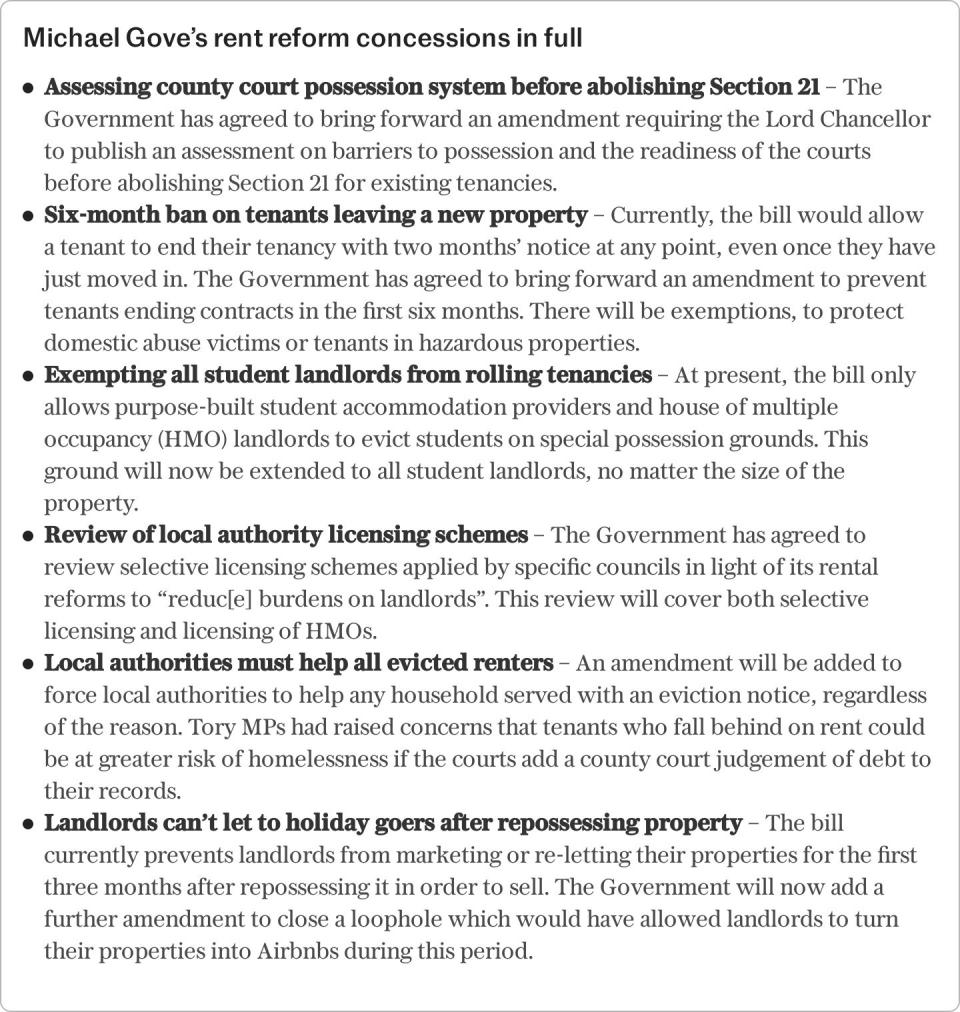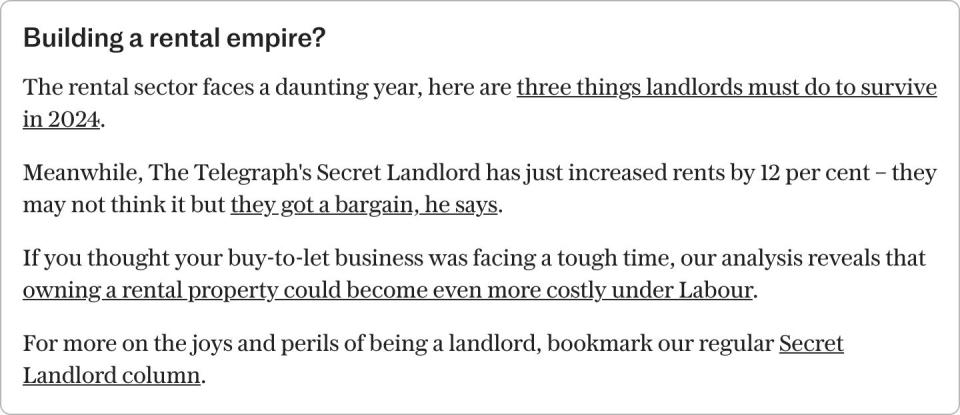Tory rent reforms backfire as evictions shoot up

Michael Gove’s crackdown on landlords is backfiring as investors rush to remove tenants ahead of the ban on no-fault evictions.
So-called section 21 no-fault eviction notices have shot up to hit a five-year high, with the number of tenants being evicted by bailiffs rising by more than a third since 2022.
Analysis of official figures by The Telegraph found that 2,671 tenants were evicted by bailiffs in the three months to December, the highest number since before April 2019, when the Government first announced a review into no-fault evictions.
The ban is a Tory manifesto pledge and part of the Government’s Renters Reform Bill, currently at its third stage in Parliament.
The figures follow warnings from landlord MPs attempting to water down the bill that its measures would spark an exodus of landlords from the market, resulting in a spike in evictions, a reduction in housing supply and a corresponding increase in rents.
Rents are now rising at a record 9.2pc, according to data from the Office for National Statistics published this week.
Marco Longhi, Tory MP for Dudley North said the proposed legislation was having “unintended consequences”.
“I am a landlord and have been for two decades. I have consistently said that, whilst well-meaning, the Renters Reform Bill is bad for tenants.
“At a time when there is already insufficient supply to meet demand for rented property, this legislation is reducing the number of properties available for rent because landlords are increasingly finding it not worth their while.
“The consequence of lower supply and higher demand is creating very high rental prices, and rather than supporting really tough market conditions for tenants the Bill is actually making it worse for them.
“There are bad landlords about, but they should be specifically targeted and existing legislation should be implemented rather than applying a one size fits all approach that will be harmful to landlords and tenants.”
Currently, a landlord can evict a tenant for no reason without going through the courts as long as they give two months notice. However, under plans to abolish no-fault evictions, landlords will need to seek court permission before evicting a tenant.
Property owners fear this could add months to evictions, with courts already weighed down by delays.
Eviction figures, published by the Ministry of Justice every three months, only take into account section 21 notices that pass through the courts.
The data show that Section 21 evictions carried out by bailiffs have steadily risen since the pandemic, when they were briefly banned.
In the three months from July 2019, when the policy was first suggested, there were 1,946 tenants evicted by bailiffs. In the last three months of 2023 there were 2,671, a rise of 38pc.
Michael Gove’s proposals to scrap no-fault evictions were first announced in 2019 in the Tory manifesto. But the Renters Reform Bill that would enforce a ban has been repeatedly delayed from Parliament amid pressure from landlord MPs.
In March, the Levelling Up Secretary sent a letter to Conservative MPs laying out a series of amendments to the incoming Renters Reform Bill.

It followed strong backlash from some 50 backbench MPs, many of whom are landlords, who were concerned that the bill would breed uncertainty and drive property investors out of the market.
David Jones, Conservative MP for Clwyd West, said: “This was entirely foreseeable. The reason section 21 was brought in under Margaret Thatcher was to make sure we had a more fluid housing market, because previously we were finding that landlords couldn’t obtain possession of their properties under any circumstances – and in some cases property was kept out of their hands for two generations.
“What will be more worrying is if more private rental properties are being taken out of the market. Landlords who would otherwise have been happy to allow tenants to remain are concerned they will have difficulty obtaining vacant possession.
“Any interference with the housing market that advantages one side against the other is obviously going to have a distortive effect on the market.
“What we don’t want is a situation where people will not be able to find a private property for tenancy purposes and I am concerned that this is what’s happening now.”
With a general election potentially on the horizon for the summer, there are questions as to whether the bill will make it through Parliament at all.
The threat of regulation has prompted many landlords to flee the market entirely. One in 10 are expected to sell up this year, according to a survey by the National Residential Landlords Association Trade body.
Accountancy firm PwC warned that an exodus of private landlords could be damaging for Britain’s economy.
Research conducted by the company found that a 10pc exodus of small and medium landlords from the private rental sector would wipe out £4.5bn and 39,000 jobs.


 Yahoo Finance
Yahoo Finance 